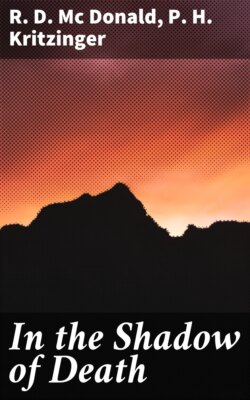Читать книгу In the Shadow of Death - P. H. Kritzinger - Страница 14
На сайте Литреса книга снята с продажи.
MOSTERT'S HOEK.
ОглавлениеThe victory at Sanna's Post was soon followed up by another success over the British arms. On the evening of the eventful day at the Waterworks De Wet handed the command over to Generals A. Cronje and Piet De Wet, and, having taken three of his staff, he went in the direction of Dewetsdorp on a reconnoitring expedition.
The following day he learnt that a party of the enemy had occupied Dewetsdorp. On receiving the report his mind was made up: these too must be captured. He was then thirty miles away from the commandoes, but instantly despatched a report to us to come post-haste so as to attack the enemy at Dewetsdorp or intercept them, should they try to join the main body, which was advancing under Gatacre on Reddersburg.
In the meanwhile the burghers of that district, who had gone to their farms on the fall of Bloemfontein, were commandeered. With these, some 120, who were almost all unarmed, De Wet started for Dewetsdorp to watch the movements of the British.
Early on the 2nd of April the enemy left Dewetsdorp, and resumed their march to Reddersburg. While marching De Wet kept them all the while under surveillance. He was moving on one of their flanks, parallel to them with an intervening distance of six miles. They were evidently not aware that he was so close to them. As soon as we received the report concerning the British, we left Sanna's Post in haste. We required no urging on. For were we not encouraged by our recent success, and was there not every chance of achieving another? We left Sanna's Post a little before sunset, and that whole night we rode on without off-saddling once. We did not halt save for a few minutes to rest our horses.
Early the following morning a third report, pressing us to increase our speed and leave behind those whose horses were too tired to proceed rapidly, reached us. De Wet was most anxious to occupy a ridge in front of the enemy, between the farms Mostert's Hoek and Sterkfontein. The road leading to Reddersburg from Dewetsdorp traverses this ridge. Hence it was absolutely necessary to seize it before the enemy if we were to intercept them.
So on we went, leaving the weary and exhausted behind to follow on as soon as possible. About 9 A.m. Generals Froneman and De Villiers, with 350 men, met De Wet, who was still moving parallel to the British column, obscured from their view by a rising of the ground.
The ridge referred to already loomed now in the distance. We were all fiercely anxious to seize it before the enemy. For it was a question of life and death who was to be first there. But our horses were too tired, and began to fall out rapidly. We were still four miles from the ridge when the English began to occupy the eastern extremity of it. We moved on to the western extremity, and reached it in time.
The enemy, however, had the advantage of the best positions, but was fortunately cut off from the water. We were resolved to hem them in completely, for we knew that, if no relieving forces arrived, they would be compelled by thirst alone, if nothing else, to surrender.
Before commencing the fight, De Wet, anxious as usual to avoid unnecessary bloodshed, sent the following note to the commanding officer:—
"SIR—I am here with 500 men, and am every moment expecting reinforcements with three Krupps, against which you will not be able to hold out. I therefore advise you, in order to prevent bloodshed, to surrender."
The messenger returned under a storm of bullets, for no sooner had he left the English lines than they opened fire on him. How he was missed seemed inexplicable. The answer he brought back was: "I am d——d if I surrender." On receiving this reply firing at once commenced. Positions nearer to the enemy were gradually occupied.
Towards sunset our guns arrived, and were brought to bear upon the enemy. But darkness soon set in, and firing ceased on both sides. To make sure that the enemy would not escape during the night, we occupied positions all round them, and in the darkness of the night silently stole as near to their positions as was possible.
The next morning, as soon as the glimmer of dawn revealed the Mauser sights to our eyes, the firing started with renewed vigour. We had drawn so close to the enemy that when our guns were brought in action we could, under cover of these, storm their positions. The men boldly rushed up to the enemy's skanzes, and some burghers even seized their rifles by the barrels, as they presented these over the bulwarks, calling out, "Hands up! hands up!"
At 11 A.m. the white flag was hoisted. The commanding officer, who had refused to surrender, was mortally wounded. Three hundred and seventy were sent to the Transvaal as prisoners-of-war, while their wounded and killed numbered 92.
Among the English we found five Boer prisoners-of-war, who were likewise exposed to our firing. Imagine their joy in being released! They greeted us with the ejaculation: "Thank God we are free!" We mourned the death of Veldt Cornet du Plessis of Kroonstad, who fell after the white flag had been hoisted. That such mistakes should occur! Six or seven burghers were wounded.
